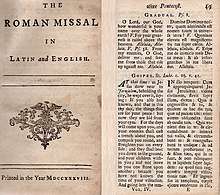John Gother
John Gother (died 1704), also known as John Goter, was an English convert to Catholicism, priest, controvertist and eirenicist.
Life
Born at Southampton, England, Gother was educated a strict Presbyterian, but part at least of his mother's family were Catholics. Gother himself was converted to Catholicism as a boy and on 10 January 1668 entered the English College at Lisbon, a seminary for the formation of Catholic clergy.
Ordained priest in 1676, he returned to England in 1681 to work on the mission in London, where at least from 1685 he began to devote time to writing works of religious controversy. At heart, Gother was something of an eirenicist, trying to present in clear language the tenets of the Christian faith as belonging to Catholicism, with a view to convincing Protestants that (at very least) Catholic doctrine was not a hotch-potch of unscriptural superstititions; and by often emphasizing prayer and spiritual experience. Naturally, he worked in the hope of encouraging conversions to the Catholic Church. In later life he wrote many works of a devotional character, which were popular for well over a century and important in keeping up Catholic spirits in the grey years after 1688.
Later, at an unknown date (possibly 1688), Gother became chaplain to the recusant family of George Holman of Warkworth, Northamptonshire, at the Castle or Manor. It was there that he instructed and received into the Catholic Church a boy called Richard Challoner, son of the housekeeper, who was later to become a Bishop and Vicar Apostolic of the London District. Challoner, one of the most impressive characters of the period of English persecution of Catholics, made his own not a few aspects of Gother's eirenicism and programme of spiritual promotion.
Gother is said to have been put forward as a possible successor to Bishop Philip Michael Ellis (OSB), who had been appointed the first Vicar Apostolic of the Western District in 1688, but almost immediately imprisoned by the Revolution and then forced to take refuge first at Saint-Germain and afterwards in Rome, resigning the post as Vicar Apostolic in 1704. However that may be, Gother was sent in 1704 to be President of the College at Lisbon.
Already ill at his departure, Gother died at sea, probably on October 1704, after receiving the last rites from another Catholic priest on board. Unusually, his body was preserved and brought to port. It was said this was because of the impression Gother had made by his saintliness on the ship's captain. On arrival at Lisbon it was conveyed to the English College, where it was interred in the chapel. The College remained in function until the last quarter of the 20th century.
On his death he left in manuscript form a revision of the Gospel and Epistle readings for the Mass. He felt this was necessary since the Rheims Version of 1582 was becoming dated by this time. His manuscript was used by Rev. William Crathorne (1670-1739) in a series of missals first published circa 1719, which presented readings from the Mass in parallel Latin and English columns.[1]

Works
His work, A Papist Misrepresented and Represented, lists at length commonly held errors as to Catholic doctrine and practice. All such errors are duly "refuted" in the manner of the time, but courteously and in an English style that was well regarded. Various Anglican divines made reply, including notably Edward Stillingfleet, later Anglican Bishop of Worcester, in a prolonged series of rejoinders and counter-rejoinders.
The principal among John Gother's many works, some translated into other languages, are:
- A Papist Misrepresented and Represented, or a two-fold Character of Popery (London, 1665 but often republished into the 20th century)
- Nubes Testium, or a Collection of the Primitive Fathers (London, 1686)
- The Sincere Christian's Guide in the Choice of a Religion (London, 1804)
- Instructions of the Epistles and Gospels of the Whole Year (London, 1780)
- The Sinner's Complaint to God (London, 1839)
- Principles and Rules of the Gospel (London, 1718
- A Practical Catechism
- Instructions and Devotions for Hearing Mass (London, 1767)
- Instructions for Confession, Communion and Confirmation (Dublin, 1825).
William Crathorne edited The Spiritual Works of Rev. John Gother in 1718 (16 vols.).
References
- ’’ Ohlhausen, Sidney K., “John Gother’s Translation of the Gospels and Epistles,” Bible Editions and Versions, Vol. 13, No. 4, 2012,
- Godfrey Anstruther, The Seminary Priests, Mayhew-McCrimmond, Great Wakering, vol. 3, 1976, p. 81.
- Eamon Duffy, "Richard Challoner 1691-1781: A Memoir", in Eamon Duffy (ed.), Challoner and his Church: A Catholic Bishop in Georgian England, Darton, Longman & Todd, London, 1981, pp. 1–26.
- George Every, "John Gother with Laborious Christians, 1680-1704", in Heythrop Journal 22 (1981) 30-45.
For his works see T .C. Clancy, English Catholic Books 1641-1700, Chicago, 1973, nn. 431-473.
- Attribution
![]()